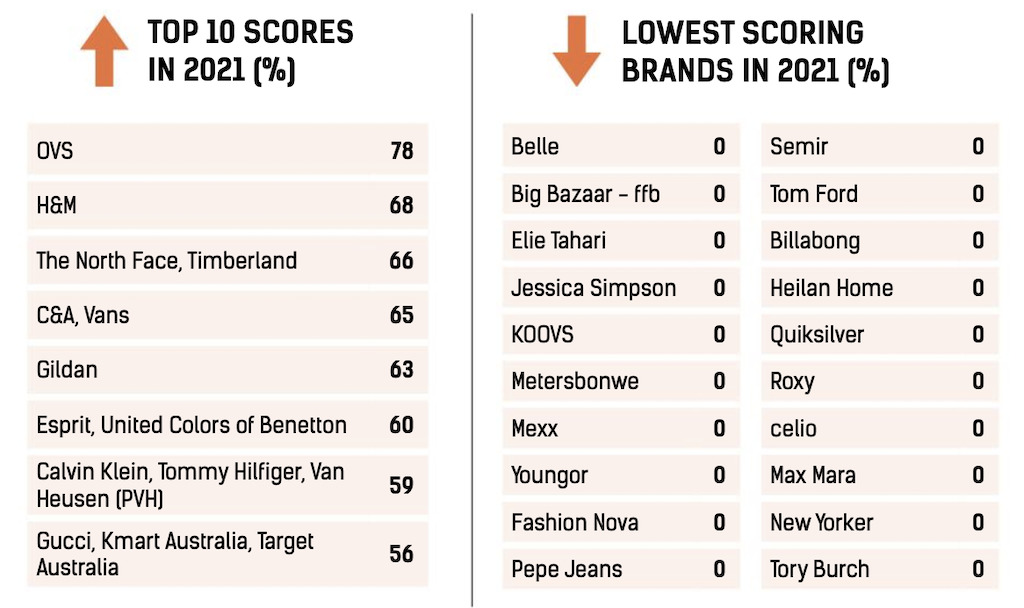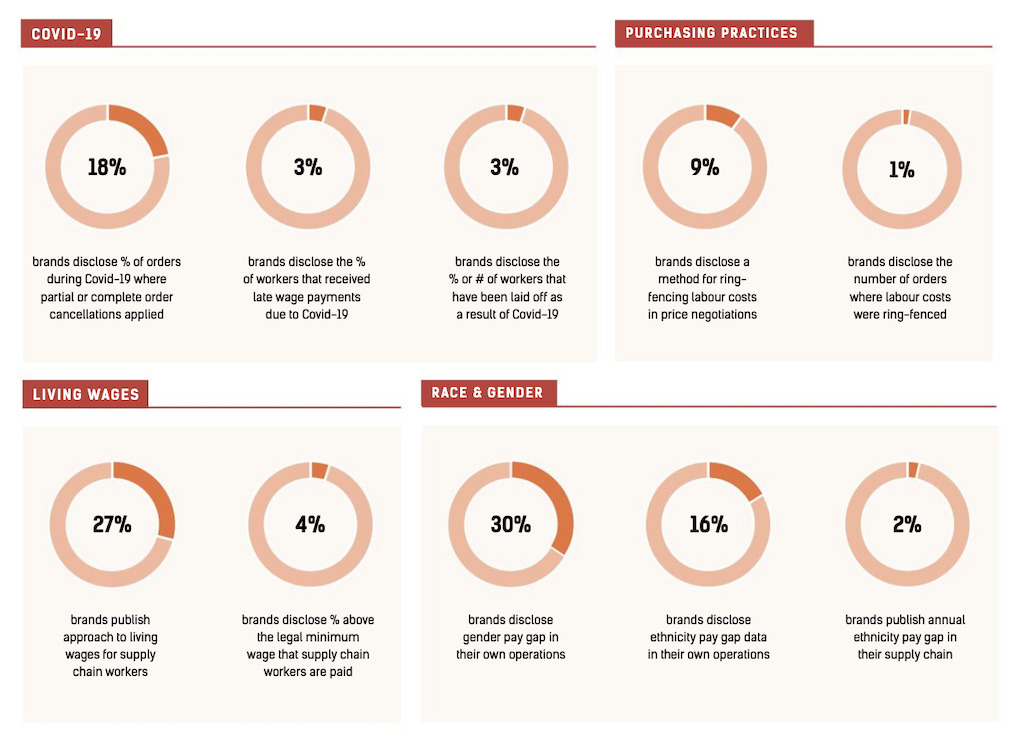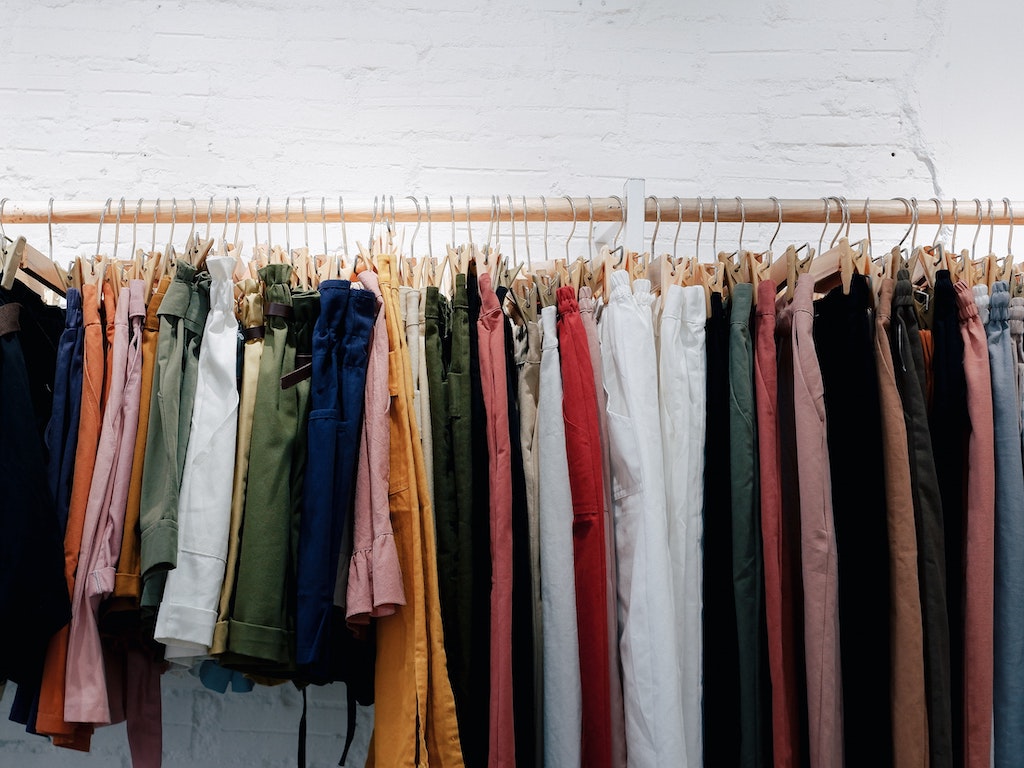4 Mins Read
The latest index released by the nonprofit Fashion Revolution shows that 99% of major fashion brands still aren’t transparent about living wages. In the new Fashion Transparency Index 2021, the industry was also called out on its lack of disclosure over Covid-19 response and climate action.
The Fashion Transparency Index 2021 tracks 250 of the world’s biggest brands and retailers in fashion. It is the sixth annual edition released by Fashion Revolution, a nonprofit founded in 2014 in the wake of the Rana Plaza building collapse, where more than a thousand garment workers died.
Fashion Revolution said that that progress is still “too slow”. Overall, brands achieved an average score of just 23% this year.
Companies that achieved the top overall scores include Italian group OVS, H&M, The North Face and Calvin Klein among others. The lowest performing brands—many of them scoring 0—include Roxy, Max Mara, Tory Burch, and Tom Ford.
99% of fashion brands don’t disclose living wages
Nearly all of the biggest fashion brands—99%—still don’t disclose the number of workers in their supply chain who are paid a living wage. Some players have set targets to reach this goal. But at present, 96% have no public roadmap on how they plan to achieve a living wage for all their workers.
The index is based on the information disclosed by the world’s largest fashion houses on their ESG policies, practices and impacts. It gathers information within companies’ operations, as well as throughout their supply chains.
“Transparency underpins transformative change,” wrote the authors. “But unfortunately, much of the fashion value chain remains opaque while human and environmental exploitation thrives with impunity.”
Brands also keep in secret their policy when it comes to paying suppliers, which in turn impacts the garment workers they employ. Less than 10% of the brands in the index have outlined a policy to pay suppliers within 60 days. This could mean that many of us are wearing clothes before brands have even paid factories that made them.

Transparency underpins transformative change.
Fashion Transparency Index 2021, Fashion Revolution
No transparency on Covid-19 response
Out of all the fashion brands assessed, just 3% made public the number of the workers they have laid-off due to the pandemic. Fewer than one in five (18%) of all major brands disclosed how many complete or partial orders they have cancelled.
“[This] leaves us with an ‘incomplete picture’ of the negative socio-economic impact workers have faced throughout the pandemic,” said the report.
During Covid-19, many garment workers faced a loss of income and even unpaid wages due to cancelled orders from brands. Many of these workers are based in Southeast Asia, and are among the poorest and most vulnerable in society.
Some of the brands called out for these practices at the time by NGOs like Fashion Revolution and XR Fashion included Walmart and M&S.

Climate action
Despite ramping up their sustainability pledges in response to consumer demand, brands aren’t forthcoming when it comes to climate transparency either.
Just 14% of all major brands disclosed the number of products they make each year. This means that we just don’t know how many pieces of clothing are being produced. It also makes it difficult for researchers to calculate the huge scale of overproduction.
Fashion value chain remains opaque.
Fashion Transparency Index 2021, Fashion Revolution
Though 62% of brands did publish their carbon footprint within their operations, they don’t extend this disclosure throughout their supply chain.
Around a quarter (26%) have published carbon footprint data on their processing and manufacturing level. When it comes to the raw material level, just 17% do so.
It’s a similar story with plastic waste. More than a third of brands publicly stated how much progress they were making in reducing virgin plastic packaging use, but only 18% disclosed the percentage of fossil fuel-derived textiles they used.
Another report also identified synthetic textiles as a major area where brands were failing to be fully transparent about. Released by Changing Markets Foundation, the report says as many as 59% of brands’ plastic sustainability claims were misleading.
Lead image courtesy of Unsplash.




